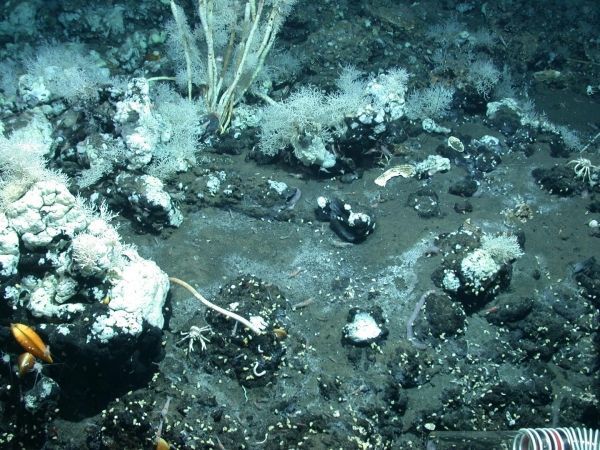The COVID-19 pandemic is a stark reminder that we move through a world shaped by unseen life. Bacteria, viruses, and other microscopic organisms regulate the Earth’s vital functions and resources, from the air we breathe to all our food and most of our energy sources. An estimated one-third of the Earth’s microbes are literally hidden, buried in sediments deep below the ocean floor. Now, scientists have shown that these “deep biosphere” microbes aren’t staying put but are bubbling up to the ocean floor along with fluids from buried petroleum reservoirs. These hitchhikers in petroleum seeps are diversifying the microbial community that thrives at the seafloor, impacting deep-sea processes, such as carbon cycling, that have global implications.
“This study confirms that petroleum seeps are a conduit for transporting life from the deep biosphere to the seafloor,” says co-author Emil Ruff, a scientist at the Marine Biological Laboratory (MBL), Woods Hole. The study, led by Anirban Chakraborty and Casey Hubert of the University of Calgary, is published this week in Proceedings of the National Academy of Sciences.
The team analyzed 172 seafloor sediment samples from the eastern Gulf of Mexico that had been collected as part of a 2011 survey for the oil industry. A fraction of these samples contained migrated gaseous hydrocarbons, the chief components of oil and gas. These petroleum seeps on the ocean floor harbored distinct microbial communities featuring bacteria and archaea that are well-known inhabitants of deep biosphere sediments.
Read more at Marine Biological Laboratory
Image: Hydrocarbon seep in the southern Gulf of Mexico emitting a viscous petroleum, much like asphalt. Hydrocarbons serve as an energy source for microbes and in turn, microbial biomass is a food source for a diverse community of organisms including tube worms, mussels, crabs and shrimp. (Credit: Center for Marine Environmental Sciences (MARUM), University of Bremen)


